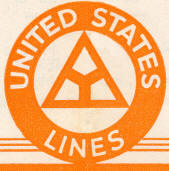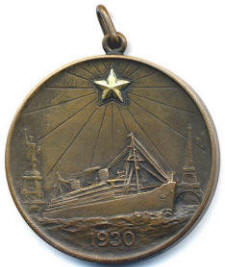|
|||
|
|
|||

Mrs.
Sylvia Thomas and I are in this picture with the other
mothers of Group M who sailed with us on the SS George
Washington. |
|||
|
|||
|
First, before we left home, the government sent us a beautiful badge to wear on the trip, and now the ship’s captain has given us a very nice remembrance medal and certificate. On the front of the medal there is a ship, the Statue of Liberty and the Eiffel tower and a large gold star at the top. Turn it over and it says “Gold Star Pilgrimage to the Battlefields of the World War”, with United States Lines under that. There is also a symbol which must be the ship owner’s logo. One of the other ladies said the medal was made by Tiffany and the star was 24 carat gold.
|
|||
My traveling companion on the ship was Mrs. Ellen Cheaney an 82-year-old widow from Aransas Pass, Texas. We first met at the train station in Houston. Her son, Dan, is also at Meuse-Argonne Cemetery with my Leo.
Mrs. [Margaret] Ellen Cheaney was a native of Kentucky. She
passed away December 7,
1939 at Aransas Pass,
TX and was buried at
Evansville, IN.
Her son, Daniel White
Cheaney, was born
December 20,
1890 at Evansville, IN. He was a Private, U.S. Army, 111 Engineer
Regiment, 36th Division and entered service from Oklahoma. He died
October 25, 1918 and was buried in Plot D Row 5 Grave 11,
Meuse-Argonne American Cemetery, Romagne, France. |
|||
|
The S.S. George Washington had a long and colorful history. She was built at Stettin, Germany in 1908 as the 25,570 gross ton passenger liner George Washington. With a capacity of nearly 2700 passengers (nearly half in the steerage class mainly used by emigrants seeking new homes in America), she was employed commercially in trans-Atlantic service under the German flag. The outbreak of World War I at the beginning of August 1914 found her at her terminal at Hoboken, New Jersey, across the Hudson River from New York City. There she remained, inactive, until the United States entered the conflict in early April 1917.
Seized by the U.S. Government at that time, the big liner was converted for Naval service at the New York Navy Yard, and placed in commission as USS George Washington in September 1917, while still in the shipyard. Later assigned the registry ID # 3018, she began carrying troops to Europe early in December. During the next two years, eleven months of war and thirteen months following the 11 November 1918 Armistice, she transported some 48,000 people from the U.S. to Europe and returned 34,000 to America. USS George Washington also played an important role in post-war diplomatic efforts, twice taking President Woodrow Wilson to France for the prolonged negotiations that lead to the Treaty of Versailles. In the fall of 1919, she brought the Belgian King and Queen to the United States for a visit commemorating their Nation’s role in the “Great War”.
USS George Washington was decommissioned in late November 1919 and turned over to the War Department. Following service as the Army Transport George Washington, in 1921 she returned to commercial employment as the American flag liner of the same name owned and operated by the United States Lines. Her crowning glory was to serve as a carrier for the Gold Star Mothers Pilgrimage of 1930.
Inactive for ten
years beginning in 1931, she was briefly USS Catlin (AP-19)
in 1941 and was operated as the British and U.S. civilian-manned
transport George Washington in 1941-1942. The ship was then
given new oil-fired boilers to improve her performance and, from
April 1943, was again the Army Transport George Washington.
Laid up in 1947, she was sold for scrapping in February 1951. |
|||
| Continue the Journey |





